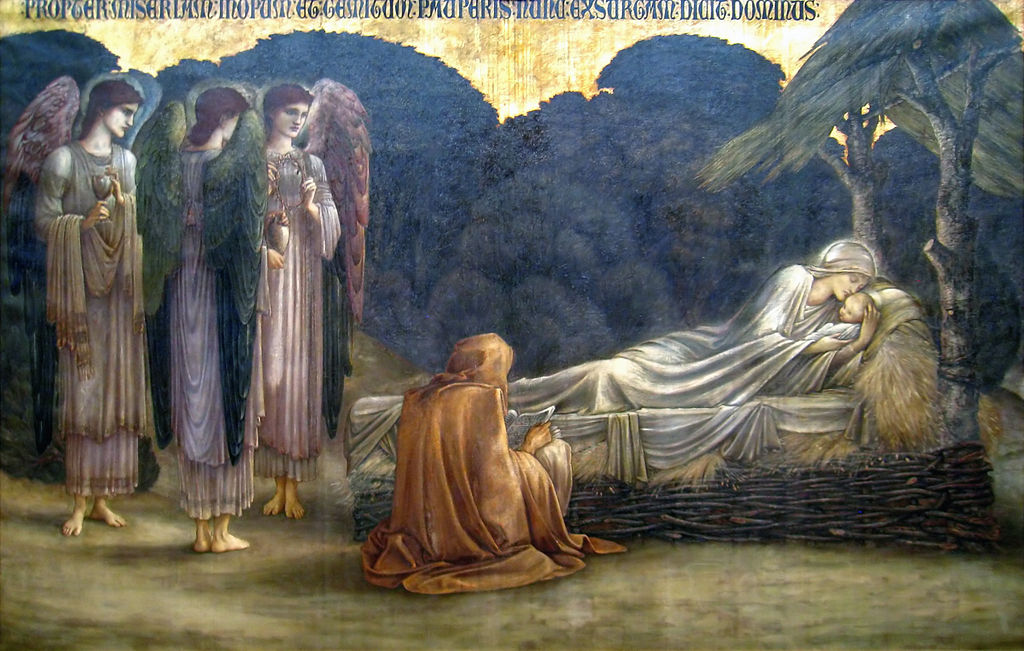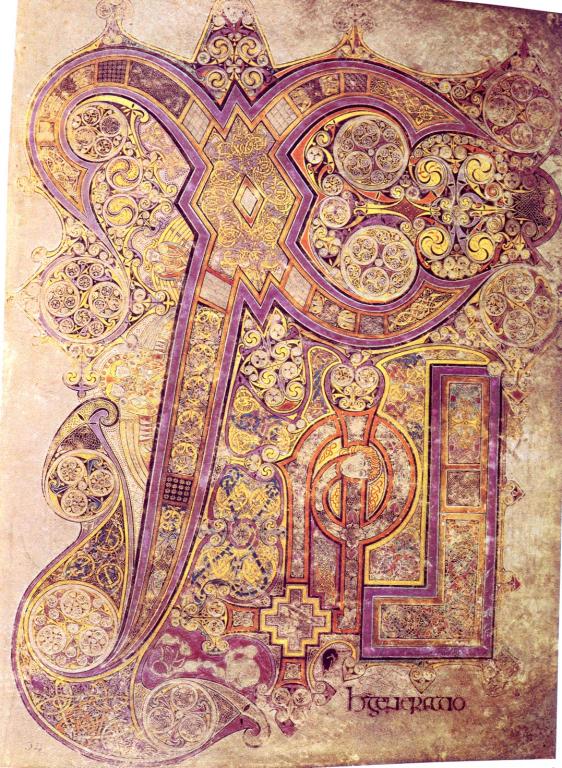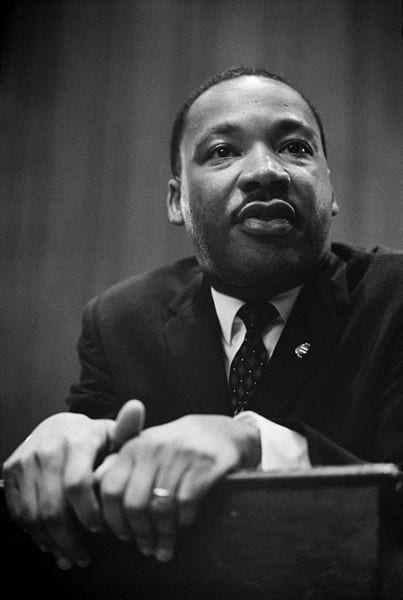David Russell Mosley

Edward Burne-Jones – Nativity, in the Carnegie Museum of Art, Pittsburgh, Pennsylvania, USA.
oil on canvas
206 x 312 cm
1888
(Public Domain)
Ordinary Time
30 January 2017
The Edge of Elfland
Hudson, New Hampshire
Dear Readers,
There’s issue I’ve mentioned but never directly written about here at Letters from the Edge of Elfland (actually there are several). I am, of course, talking about abortion. It has been in the news more recently due in large part to President Trump’s supposed pro-life stance, whether or not being against abortion ought to be a person’s primary voting emphasis, and the recent March for Life. I don’t like to write on this issue because I don’t want to be glib. For too many women men writing about abortion is seen as (and often is) an attempt at oppressing and controlling them. It is an emotional issue, one that often cannot be met with the kind of argument I would normally employ because not only are talking about the real lives of unborn babies, but the real lives of women who feel abortion is their only option. We are a culture of death and not only because our culture promotes abortion but because we promote economic and civic policies that make abortion appear the only viable option for so many women. And instead of talking about these issues we talk about punishing women or doctors who perform abortions; we talk about the importance of the unborn over and against any other issue.
The reason I’m writing about this deeply personal and emotional issue today is this: Gregory Popcak, a fellow Patheos Catholic writer, wrote a post about why, “Here’s Why Abortion Remains THE Fundamental (and Non-Negotiable) Social Justice Issue of Our Time.” Popcak argues that this issue more than any other needs to be the non-negotiable social justice issue because it is foundational. We cannot, he says, affirm the dignity of any particular person until we affirm the dignity of all people. Popcak compares this to a person who accepts that Christ is God’s Son before accepting that God exists. It’s a hierarchy of truth, says Popcak. And so we have to get the dignity of the unborn before we can get the dignity of, I would presume, refugees. Popcak doesn’t make that point explicit, but he does say:
All truths are true, all needs must be met, and yes, immigration, healthcare, education, housing, and all the rest are truly pro-life issues. This is an undeniable fact of CST. Nevertheless, overturning abortion remains the single most important, most non-negotiable, social justice problem of our day because it is the most foundational way to assert that everyone has at least a basic, God-given right to life and, by extension a right to some kind of quality of life.
This seems far too close to me making abortion the single issue on which Christians ought to vote. Do you think we should help Syrian refugees? Then vote to end abortion. Want better healthcare and business principles in order to stop women from feeling like abortion is their only option? Then vote to end abortion. It is the singularity, to the practical if not ideological exclusion of all other social justice issues that frightens me.
Part of why is because of this post from Dave Armstrong back in March: ““Pro-Lifers” Vote for Childkillers? Huh?!” Armstrong (another fellow Patheos Catholic blogger) writes at the very beginning:
I have a question for Catholic Democrats or “anti-Republicans”: if a candidate made it clear that he hated black people, or Jews, or Arabs, or Catholics, or Muslims, or had neo-Nazi affiliations, would that be an automatic dealbreaker / disqualifier, in terms of voting for him or her?
His point is that being pro-choice ought to be an automatic disqualifier. That no matter what other issues a candidate might support that are good (better healthcare and business practices, better care for the environment, better war practices, etc.) they are automatically invalidated as a viable candidate if they are pro-choice. Armstrong makes this point even more strongly when he asks, “Say, Hitler got the economy or foreign affairs right: could a good Catholic or morally traditional non-Catholic Christian vote for him in good conscience?” Armstrong admits this is a reductio ad absurdum, but says it is a useful analogy for pointing out that Catholics ought not to vote for pro-choice candidates no matter what else they get right (never mind the fact that Hitler didn’t want to make it possible to kill Jews, and others, but actually rounded them up, imprisoned them, and killed them; I know of no pro-choice candidate who wants to round up pregnant women put them in a Planned Parenthood and make them have abortions).
Armstrong also seems to miss a rather natural inversion of his own argument: At what point is a pro-life candidate invalidated? Let’s use Hitler for example (as Armstrong did, even noting that, for Aryans anyway, Hitler was at least pro-life). Let’s say he’s pro-life, but wants to kill Jews, anyone who disagrees with him, and engages a mass genocide. Would this disqualify him from being elected even though he’s pro-life? Obviously the answer is yes. And yet, if listen to Armstrong particularly (for Popcak does not, to my knowledge, champion Trump), Trump was the obvious choice, despite not simply being wrong about economics (in my opinion anyway) but in the way he treats women, minorities, and people in general. Now, Trump is no Hitler, but I do think his character and the policies he is now enacting invalidate him no matter how “pro-life” he claims to be.
This to me is about making abortion a priority in a hierarchy. If it becomes the first issue, then do we open ourselves up for voting for a candidate who merely says he or she is pro-life without considering their other positions. I’m not sure Popcak is right that it even is a hierarchical issue? Do we have to do this one thing before we can do anything else? Is it not possible that getting people to recognize the dignity of the other will lead them to recognize the dignity of the unborn? And in any event, can we not work on multiple issues at once? Are we not showing our belief in the dignity of the unborn as we support the women who feel forced into making the choice of abortion?
Let me end with this: I value life, all life. And I will work with anyone who seeks to better life for all. After all, how can I claim to be pro-life if I don’t work to help create a world that is truly better for all. This, I cannot help but believe, is part of what it means to live out Christ’s prayer that’s God name be hallowed and his will done on Earth as it is in Heaven. Yes, this means that I want to see us no longer choosing abortion. I just want to do it in ways that care for both mother and child (and father for that matter). I pray God can show us ways to move forward.
Sincerely,
David











